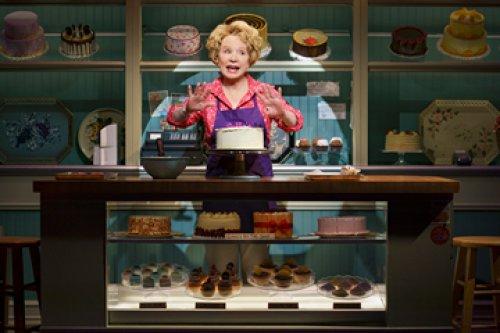The Cake
Debra Jo Rupp shines in a play inspired by the true case of a baker who refused to make a wedding cake for a gay couple.
[avatar user=”Victor Gluck” size=”96″ align=”left”] Victor Gluck, Editor-in-Chief[/avatar]

Debra Jo Rupp in a scene from Bekah Brunstetter’s “The Cake” at Manhattan Theatre Club’s New York City Center Stage I (Photo credit: Joan Marcus) Inspired by recent headlines, Bekah Brunstetter’s The Cake dramatizes a case where a Christian woman baker refuses to bake the piece de resistance for a lesbian wedding. The comedy-drama now at Manhattan Theatre Club’s New York City Center Stage I venue, complicates the issue by making the buyer in question the daughter of the baker’s best friend, almost her goddaughter. Very entertaining, the play ultimately wants to have its cake and eat it by begging the question of moral beliefs. However, the cast led by television star Debra Jo Rupp keeps the play bubbling along.
When we meet middle-aged Della she is being interviewed by Macy, a New York reporter, about her celebrated sweet shop and bakery in Winston, North Carolina, home town to the play’s author. What Della doesn’t know is that Macy is the fiancée of Jenny, the daughter of her best friend who had died five years before. Although living in NYC, Jenny has returned to Winston to plan her local wedding on the $15,000 her mother left her for just this occasion. However, Della’s religious beliefs do not allow her to condone a lesbian wedding and she tells Jen and Macy that she is too busy to make a cake for them in October. Macy sees Della as a bigot and outs her in a magazine article which has ultimate repercussions.

Debra Jo Rupp, Genevieve Angelson and Marinda Anderson in a scene from Bekah Brunstetter’s “The Cake” at Manhattan Theatre Club’s New York City enter Stage I (Photo credit: Joan Marcus)
In between, the realistic scenes are amusing dream sequences in which Della imagines herself on The Great American Baking Show, Tuesdays nights on CBS, for which she is to be a contestant in two months’ time. Everything seems to go wrong but Della is brought back to reality just in time, and her real life intrudes.
Brunstetter overloads the issue in the play by making Jen have doubts about being in love with a woman against her parents’ religious teachings, even though she cannot imagine life without the caring, compassionate, uninhibited Macy. Additionally, when Della quotes the Bible to Macy, Macy retaliates by pointing out that as a childless woman Della has not fulfilled her religious duty as a wife. The plot then goes in another direction to show us Della and her husband Tim who has lost interest in sex since he discovered he had too low a sperm count. The play builds to Jen revealing her real childhood feelings to Macy, as well as Della demanding that after years of estrangement Tim make passionate love to her as he did at the beginning of their marriage. Ultimately, Brunstetter wants to have it both ways with an ending that does not resolve the religious question at all.

Debra Jo Rupp and Dan Daily in a scene from Bekah Brunstetter’s “The Cake” at Manhattan Theatre Club’s New York City Center Stage I (Photo credit: Joan Marcus)
Lynne Meadow keeps the Manhattan Theater Club production on a droll, comic level, entertaining us even as the play seems to go off its rails. Debra Jo Rupp as Della, the strict Christian who makes the most mouthwatering cakes, is charming in a role that could be very irritating. Marinda Anderson is forceful and articulate as the African American journalist who has had about all she can take of hypocrisy that claims to have a moral basis. Genevieve Angelson is at times whiney and tearful which seems to undercut her Jen. Dan Daily’s Tim seems mainly a device for Della to be able to discuss her opinions, but he is better used as George, the voice of the host of the baking show that Della watches obsessively.
Part of the fun of the production is John Lee Beatty’s magnificent nearly two-story candy-colored bakery setting with its real and prop cakes. Philip S. Rosenberg’s play of purple and blue lights on the bakery set makes the desserts look even more luscious. Also hidden somewhere on the stage are Della and Tim’s bedroom, and Jen and Macy’s guest room at the home of Jen’s Cousin Cliff. Tom Broecker’s casual day clothing is attractive but his wedding costumes are a knock-out. Tommy Kurzman is responsible for the hair, wig and make-up design which has a dramatic role to play in the storyline. John Gromada is responsible for the excellent original music and sound design.
Marinda Anderson and Genevieve Angelson in a scene from Bekah Brunstetter’s “The Cake” at Manhattan Theater Club’s New York City Center Stage I (Photo credit: Joan Marcus)
Bekah Brunstetter’s The Cake is an entertaining attempt to deal with religious discrimination in the workplace. While the play neither goes as far as it could, nor sticks to the initial problem, it does open up the issue in an appealing manner. With its hard-working foursome and a perfectly cast Debra Jo Rupp, best known for her Kitty Forman on That 70’s Show, The Cake is more than a comedy but less than a total success.
The Cake (through March 31, 2019)
Manhattan Theatre Club
New York City Center Stage I, 131 W. 55th Street, in Manhattan
For tickets, call 212-581-1212 or visit http://www.nycitycenter.org
Running time: one hour and 30 minutes with no intermission






Leave a comment